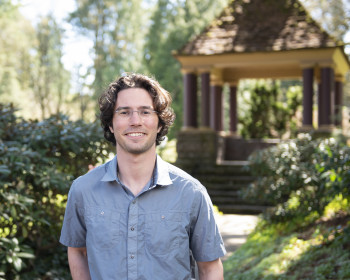Alumna serves as pioneer for social justice
“When you envision a lawyer, what do you see?”
Haben Girma BA ’10 posed this question to her audience at the recent TEDxBaltimore conference, where she spoke about the role of public service lawyers as pioneering advocates for social justice.
Open gallery

“When you envision a lawyer, what do you see?”
Haben Girma BA ’10 posed this question to her audience at the recent TEDxBaltimore conference, where she spoke about the role of public service lawyers as pioneering advocates for social justice. As a Skadden fellow at Disability Rights Advocates in Berkeley, California, Girma works to improve educational access for students with disabilities and is dedicated to challenging common perceptions of what it means to be a lawyer.
The path that led her to this objective is anything but conventional. Girma is the first deaf-blind graduate of Harvard Law School, named by Business Insider as one of the school’s 20 most impressive students during her time there. While still a student, she was honored as a White House Champion of Change for her extraordinary strides toward improving the lives of disabled students across the nation.
As a prospective student at Lewis & Clark, Girma was particularly attracted to the Office of Student Support Services and its friendly team.
“The staff at Student Support Services proved to be amazing,” Girma said. “They worked to get me my course materials in braille, spoke directly with my professors about what accommodations would be needed, and so much more. All I had to do was be a student and do my work, which was perfect.”
But Girma needed to advocate for herself when campus food service provider Bon Appétit did not email her with each day’s menu of meal options.
“For the first few months of school, I didn’t know what I was eating most of the time,” Girma explained. “I thought, ‘Do I just deal and let it go, or do I do something about it?’”
Becoming familiar with the Americans with Disabilities Act (ADA) and recognizing her legal right to receive the menu every day was a pivotal moment for Girma; if she continued to say nothing, the rights of future blind students at Lewis & Clark could also be jeopardized. Girma ultimately confronted the food service provider and threatened to take legal action if she did not receive daily updates.
“After teaching the dining hall staff about the ADA, everything changed,” Girma explained. “They agreed to provide menus consistently, and they did.”
This facilitation of change was an empowering act that—in addition to a lifetime of other experiences with self-advocacy—inspired Girma to pursue a career in law.
Reflecting on her own experience, Girma encourages current students to not only advocate for themselves in situations of difficulty, but also to take advantage of Lewis & Clark’s rich array of resources.
Said Girma, “I felt that there were a lot of supportive people at Lewis & Clark. I really enjoyed my experience as a whole.”
Katrina Staaf ’16 contributed to this story.
More Newsroom Stories
Public Relations is located in McAfee on the Undergraduate Campus.
MSC: 19
email public@lclark.edu
voice 503-768-7970
Public Relations
Lewis & Clark
615 S. Palatine Hill Road MSC 19
Portland OR 97219

